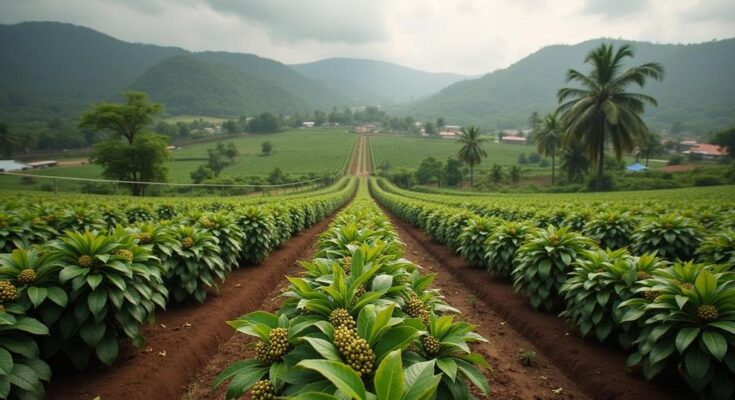The Democratic Republic of the Congo is experiencing a resurgence in its coffee industry, which had suffered due to years of conflict. USAID initiatives are helping coffee farmers improve production techniques and market access, leading to higher-quality exports. Key achievements include pre-harvest financing deals and participation in international competitions. Farmers are empowered by new knowledge and better market conditions, significantly enhancing their livelihoods.
In the Democratic Republic of the Congo (DRC), a revival is underway for a once-thriving coffee industry that suffered significantly due to prolonged instability and conflict. Recent data indicates that international demand for specialty coffee has reached unprecedented levels, prompting efforts to rejuvenate the country’s coffee production capabilities and restore its status as a prominent coffee exporter. The USAID-funded initiative in South Kivu supports coffee farmer cooperatives in enhancing their production processes, from harvesting techniques to market delivery and establishing connections with international buyers. Training sessions focus on key practices, such as harvesting coffee cherries at their optimal ripeness—a crucial factor that differentiates high-value specialty coffee from lower quality variants. The fruits of this initiative have led to notable progress. Armed with newly acquired business skills, coffee cooperatives successfully negotiated a pre-harvest financing arrangement with Westrock Coffee, enabling them to receive advance payments for their coffee cherries immediately upon harvest. In 2015, cooperatives from South Kivu showcased their products at the first international coffee cupping competition held in the DRC, receiving accolades for excellence. Timothy Fella, an international judge and coffee buyer for Counter Culture Coffee, remarked, “I am … trying to get my hands on as much of this coffee as possible, and I have no doubt there are buyers lined up trying to get it.” This newfound recognition has allowed the cooperatives to sell five shipping containers of washed coffee beans to esteemed U.S. retailers, including Starbucks and Sweet Marias, with the beans promoted as single-origin Congolese coffee. As these farmers gain access to better pricing through international sales, local traders are responding favorably, offering improved deals for their remaining harvest. Constantin Kasikagwe Mukuba, a coffee farmer from South Kivu, reflected on the past difficulties, stating, “In the past, we didn’t know how to sell our coffee. We could only sell it to Rwanda.” Previously, the export process involved perilous journeys across a large lake, often resulting in tragic incidents. Today, the improved market conditions have alleviated the pressure to engage in illegal exports, marking a significant change in the farmers’ livelihoods. To further enhance the coffee sector’s professionalism, USAID established the region’s first coffee-tasting laboratory in Bukavu, managed by the Office Nationale du Café. This facility plays a crucial role in certifying coffee quality prior to export and provides training in world-class tasting techniques to both coffee farmers and regulatory staff. The Kivu Specialty Coffee: Kahawa Bora Ya Kivu project, collectively funded by USAID and the Howard G. Buffett Foundation, commenced in 2012. Its goals include boosting the livelihoods of smallholder farmers, strengthening cooperative business operations, reforming relevant government policies, and promoting Congolese coffee internationally. Farmers are increasingly empowered to attract buyers from various regions, including the United States, Europe, and Korea, cultivating a sense of professionalism and pride in their work. Mukuba eloquently stated, “Now we have everything we need here. Thanks to the fields, I can educate my children. I can feed my family.”
The Democratic Republic of the Congo (DRC) has a historical legacy of coffee production that has been hampered by decades of conflict and instability, leading to a decline in both production and market value. As the demand for specialty coffee grows globally, initiatives by organizations such as USAID are vital for reviving the coffee sector in the DRC. These initiatives focus on providing practical training to coffee farmers, improving quality control, and enhancing market access, ultimately aiming to restore the DRC’s reputation in the international coffee arena.
The revival of the coffee industry in the Democratic Republic of the Congo represents a promising shift for local farmers, driven by international demand and substantial training initiatives. As farmers adapt to better cultivation and marketing practices, they are not only able to gain higher prices for their produce but also improve their overall livelihoods. The establishment of a coffee-tasting laboratory and international recognition through competitions further solidifies this change, paving the way for a sustainable future for Congolese coffee farmers.
Original Source: www.usaid.gov




